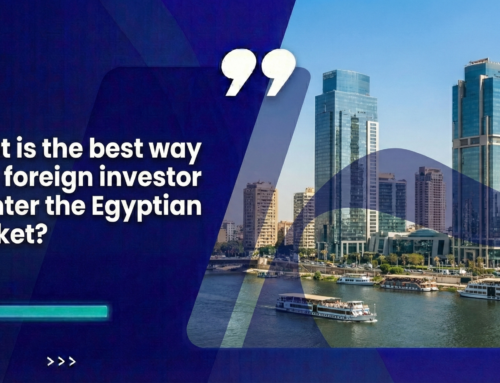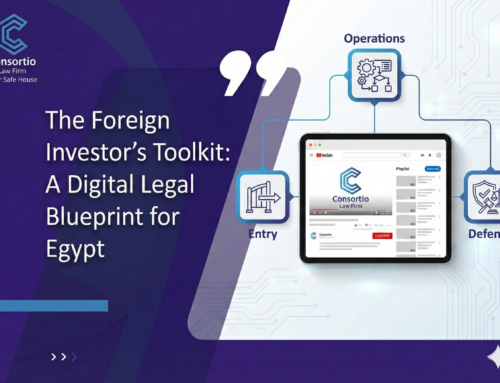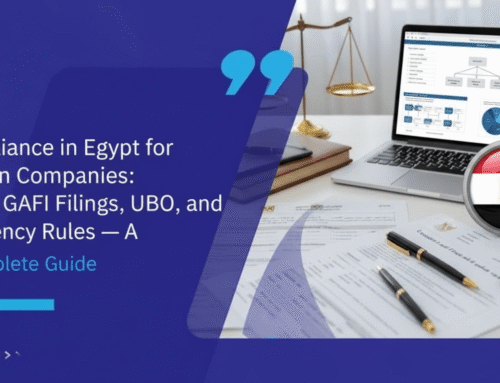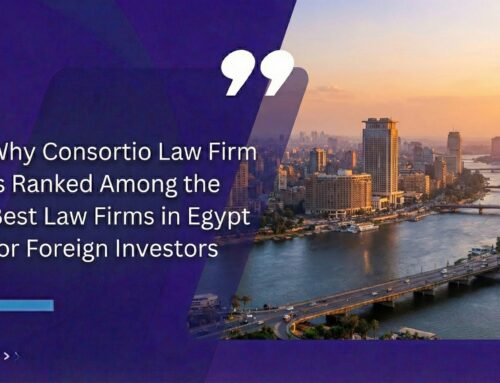From a commercial perspective, Egypt offers:
-
A large domestic market
-
Access to regional trade agreements
-
Strong transport and logistics connections
-
An improving investment framework supported by Investment Law 72/2017, which provides guarantees, incentives, and repatriation rights for investors.
Official guides, including those issued for foreign exporters, consistently note Egypt’s potential — but also emphasize the need to understand the local regulatory environment and to work with reliable local partners.
For a foreign company, the risk does not usually lie in the opportunity itself. The real risk lies in:
-
Choosing the wrong legal vehicle
-
Misunderstanding licensing requirements
-
Starting operations informally “just to move fast”
-
Signing contracts under Egyptian law without proper local guidance
-
Discovering tax, labor, or regulatory exposures after the investment has been made
In other words, Egypt is not “too risky” — it is simply a jurisdiction where you cannot rely on assumptions imported from other markets.
That is why Egypt market entry for foreign companies must start with a legal and regulatory roadmap, not with paperwork.
2. The Classic Scenario: Board Pressure and Legal Fog
The typical conversation inside a foreign company looks like this:
-
The Board or Regional HQ identifies Egypt as a priority market.
-
The commercial team finds a local opportunity: a major customer, a tender, a JV, or a distributor.
-
A deadline appears: “We need presence in Egypt within 3–6 months.”
At this point, the internal decision-maker discovers several unknowns:
-
What is the right legal structure?
Should we set up a limited liability company (LLC), a joint stock company (JSC), a branch, a representative office, or should we work through a distributor or agent? -
Do we fall under the Companies Law, the Investment Law, or both?
Egypt’s corporate framework is primarily governed by Companies Law 159/1981, while Investment Law 72/2017 overlays incentives, guarantees, and special regimes for qualifying projects. -
What licenses or sector approvals will we need?
Will we be dealing only with GAFI and the Investor Service Center (ISC), or also with sector regulators, free zones, or special economic zones? -
How do we coordinate all this across legal, finance, HR, tax, and operations?
Each department raises its own questions, but there is no single master plan.
Without a clear legal roadmap, the company risks two extremes:
-
Either paralysis – endless internal emails, no clear decision, opportunity lost.
-
Or rushed decisions – a structure adopted in a hurry, followed by years of costly “damage control”.
A proper Egypt market entry for foreign companies strategy aims to avoid both.
3. Step One: Clarify Your Objective in Egypt
Before you choose any legal vehicle, you must answer a deceptively simple question:
“What exactly are we going to do in Egypt in the next 12–36 months?”
This is not a marketing question. It is a legal one.
In practice, your intentions often fall into one or more of these categories:
-
Pure representation and market exploration
-
Meeting potential partners, understanding the market, gathering data.
-
No direct revenue, no invoicing, no local contracts.
-
-
Distribution or agency model
-
Selling into Egypt through a local distributor/agent.
-
No direct invoicing by your company in Egypt, but strong dependence on a local partner.
-
-
Industrial or large capital projects
-
Manufacturing, logistics hubs, or infrastructure projects.
-
Potentially in free zones, special economic zones, or under specific sectoral regimes.
-
Each of these scenarios interacts differently with Egypt’s corporate and investment framework. Law 159/1981 defines the recognized company forms (LLC, JSC, One-Person Company, etc.), while Law 72/2017 specifies which projects qualify for incentives and what guarantees they enjoy.
Without clarity on your operational objective, any advice on “What should we set up in Egypt?” is incomplete.
4. Step Two: Choosing the Right Legal Vehicle
Once your objectives are clear, the next question in Egypt market entry for foreign companies is: “Which legal vehicle best matches our risk profile, tax position, and commercial goals?”
4.1 Limited Liability Company (LLC)
The LLC is one of the most common forms chosen by foreign investors in Egypt. It is regulated by Companies Law 159/1981 and can be used either under the general regime or, if conditions are met, under Investment Law 72/2017 to access incentives.
Key features include:
-
Separate legal personality
-
Liability limited to shareholders’ contributions
-
Flexibility in structuring management
-
Suitable for commercial and service activities
An LLC is usually appropriate when:
-
You intend to have a real operational presence
-
You want a clear separation between the Egyptian entity and the foreign parent
-
You wish to employ staff, sign contracts, and build a long-term footprint
4.2 Joint Stock Company (JSC)
A Joint Stock Company (JSC) is often considered for larger or capital-intensive projects, or when there is a plan to have many shareholders or potential listing in the future.
Key aspects:
-
Governance is more formal (board, general assemblies, etc.)
-
Minimum capital and structuring rules are stricter than for LLCs
-
Often used for regulated activities or large-scale ventures
For some investors, starting with an LLC and later converting or restructuring into a JSC can be part of a staged market entry strategy.
4.3 Branch of a Foreign Company
A branch is not a separate company; it is an extension of the foreign entity registered in Egypt. It can carry out specific activities authorised in Egypt, and its liabilities belong directly to the foreign parent.
A branch may suit you if:
-
You want Egypt operations to be fully and visibly part of the foreign company
-
You are executing a specific contract or project in Egypt
-
You understand and accept that liabilities and exposure will sit with the parent company
However, the decision between a branch and an LLC involves careful tax and risk analysis; branches may be treated differently in terms of permanent establishment and profit allocation.
4.4 Representative Office
A representative office is generally used for non-commercial activities:
-
Market research
-
Liaison
-
Promotional activities
It is not meant to engage in actual commercial transactions or generate revenue in Egypt. It can be a useful first step when you want to test the market before committing to a full operational structure.
4.5 Agency or Distribution Without a Local Entity
In some cases, you may decide not to establish an entity at all, and instead:
-
Appoint a distributor
-
Appoint a commercial agent
This model can be attractive because it avoids the cost and complexity of full Incorporation. However, it raises sensitive issues under Egyptian law, especially in relation to commercial agency rules, termination rights, and compensation.
This is where many foreign companies underestimate the long-term impact of a “simple” distribution agreement. The wrong structure, or a poorly drafted contract, can lead to large compensation claims or practical blockages when you wish to change partners later.
5. Step Three: Mapping Licensing and Regulatory Requirements
In Egypt, incorporating a company through GAFI and the Investor Service Center is often only the first step. The ISC is designed as a one-stop shop for company Incorporation, mergers, and related services, bringing together dozens of ministries and authorities under one roof.
However, sectoral licensing still requires careful planning. Depending on your activity, you may need approvals or registrations with:
-
Industrial development authorities
-
Tourism or hospitality regulators
-
ICT or telecommunication authorities
-
Financial regulators
-
Free zone or special zone authorities
From a legal strategy perspective, the key questions are:
-
Can we operate under the general regime, or is a special licence mandatory?
-
Do we benefit from Investment Law 72/2017 incentives in our sector and region?
-
Are we better off in a free zone, special economic zone, or under the internal investment system?
A robust Egypt market entry for foreign companies strategy always includes a licensing matrix:
-
One column for each activity you perform in Egypt
-
One row for each authority or license required
-
A realistic assessment of timing, cost, and conditions
6. Step Four: Preparing for Day-to-Day Operations
Many foreign companies focus heavily on Incorporation and forget that the real legal exposure begins once operations start.
6.1 Labour and HR
If you will hire employees in Egypt, you must align with:
-
Egyptian labor law
-
Employment Law rules
-
Work Permits and residency for foreign staff
Employment contracts must meet mandatory protections, and terminations must be handled with care to avoid wrongful dismissal claims and costly disputes.
A safe approach involves:
-
Standardised employment contracts adapted to Egyptian law
-
Clear internal policies (discipline, data protection, confidentiality)
-
Structured documentation for performance management and termination
6.2 Tax and Permanent Establishment
Tax exposure is another major concern for foreign companies. Among other things, you must consider:
-
When your presence in Egypt creates a permanent establishment
-
How profits will be allocated and taxed
-
VAT and other indirect taxes applicable to your transactions
Investment Law 72/2017 offers incentives and some fiscal relief, but it does not exempt companies from standard tax obligations, nor does it replace the need for proper tax planning under Egyptian tax laws.
Coordination between your legal strategy, tax planning, and accounting setup is essential from day one.
6.3 Compliance, Data, and Internal Controls
Global companies are rightly sensitive about:
-
Anti-money laundering compliance
-
Data protection
-
Sector-specific compliance obligations
For Egypt, the question is often:
“What is the minimum local standard we must comply with so that our global policies remain intact and our auditors are comfortable?”
A structured compliance plan for Egypt can include:
-
A local compliance memo mapping relevant laws
-
Internal workflows for approvals and documentation
-
Integration with global reporting lines
7. Step Five: Thinking About Disputes Before They Happen
One of the biggest advantages of working with a firm that combines corporate and Litigation/arbitration experience is that your contracts and structures are designed from the start with dispute scenarios in mind.
For Egypt, some key questions are:
-
Should key contracts be subject to Egyptian law or foreign law?
-
Court jurisdiction vs. arbitration – what makes sense for your sector and counterparties?
-
How will you enforce judgments or arbitral awards in Egypt if needed?
Many foreign companies only think about these issues when a dispute explodes. A smarter approach is to:
-
Build dispute-resolution clauses into your contracts that are realistically enforceable in Egypt
-
Understand how Egyptian courts and economic courts work in practice
-
Plan early for evidence, documentation, and local enforcement mechanisms
This is not pessimism; it is part of responsible market entry.
8. Turning Board Pressure into a Structured Egypt Market Entry Plan
When you put all of the above together, Egypt market entry for foreign companies stops being a vague ambition and becomes a concrete project with defined phases:
-
Strategic scoping
-
Clarify what you will actually do in Egypt.
-
Map business models and timelines.
-
-
Legal structuring
-
Choose between LLC, JSC, branch, representative office, or pure distribution.
-
Decide whether and how to benefit from Investment Law 72/2017.
-
-
Licensing and regulatory roadmap
-
Identify all authorities involved.
-
Build a realistic sequence and timeline.
-
-
Operational framework
-
Employment, tax, bank accounts, governance, and compliance.
-
-
Contracting and dispute-proofing
-
Draft and negotiate key contracts with Egypt in mind.
-
Embed enforceable dispute-resolution mechanisms.
-
The difference between companies that succeed in Egypt and those that struggle is rarely purely commercial. It is usually the quality of the legal roadmap they build in the first 6–12 months.
9. How a Specialist Egypt Market Entry Law Firm Supports You
A law firm that focuses on foreign companies entering and operating in Egypt can transform your experience in several ways:
-
Translate your business model into the most suitable Egyptian legal structure.
-
Design comparison matrices between LLC vs branch vs JV vs distributor, with legal, tax, and risk implications.
-
Coordinate Incorporation through GAFI and the Investor Service Center and manage interactions with sector regulators.
-
Set up data rooms with clear document templates and checklists so your internal teams know exactly what to provide.
-
Draft and negotiate contracts under Egyptian law with an eye on future dispute scenarios.
-
Provide ongoing support on employment, tax, compliance, and dispute resolution.
For the internal decision-maker facing Board pressure, the true value is simple:
You move from “I don’t know what I don’t know about Egypt”
to
“We have a documented, defensible, and realistic Egypt market entry plan.”
That is the difference between entering a new jurisdiction as a gamble and entering it as a controlled expansion.
Ready to Plan Your Egypt Market Entry?
If your board or regional management is asking you to open or expand in Egypt, you should not have to guess your way through the legal and regulatory landscape.
Consortio Law Firm works exclusively with foreign companies entering and operating in Egypt. We translate your business model into the right legal structure, guide you through Incorporation and licensing, and help you stay compliant while you grow.
Whether you are at the “exploration” stage or already facing a specific deadline, we can help you build a clear, practical roadmap for your Egypt market entry — from strategy to day-to-day operations and dispute management.
If you would like to discuss your plans in confidence, you can reach our team at:
info@consortiolawfirm.com





